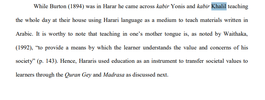Where’s your second picture from? It doesn’t say he was Somali, and there’s really no indication that he was.
I’m not fully sure about his personal background—maybe his father lived in Berbera for a while. As you probably know, Hararis didn’t always stay in Harar. Many traveled or settled in different places over time either for short or permanent time.
I’ve personally met family members of Kabir Khalil, and they come from the Zaydi family—sharifs with genealogical ties to Yemen. I’m 100% sure he was Harari. Kabir Yonis was also Harari—Richard Burton even confirms this. Both of them were pious men, and like many scholars of their kind, they only left their homes when there was a real need.
Burton clearly notes that they taught from their homes, used the Harari language, and were separate from Shaykh Jami, whom he specifically identified as Somali. Although Burton met both Kabirs, his actual communication with them was limited. Most of his interaction was with Shaykh Jami, likely because Jami was more involved in regional politics.
Shaykh Jami was no doubt knowledgeable, but he had a more political role, which set him apart from the more reclusive Kabirs. Also, it’s important to note that only Hararis use the title "Kabir." That’s a strong cultural marker. Both Hararis and Somalis use "Shaykh," but in the Harari context, "Kabir" refers to a top-tier scholar—someone seen as a saint. Kabir Khalil was even known for performing extraordinary acts, which is one reason he carried the title.
Brother, you seem like a reasonable person, and I hope you understand where I’m coming from. Kabir Khalil and Kabir Yonis lived just about 150 years ago, and yet now there are claims that they were Somali? That’s worrying. If we’re already getting things mixed up with figures from the recent past, how are we supposed to make sense of history from 800 or 1,000 years ago?
To be honest, I’ve only come across a handful of Somalis who are truly honest when it comes to history. For example, I had a Somali man from the Darod clan tell me that Shaykh Abadir was Marehan Darod, and that all Hararis and most Oromos are Darod and all Harari amirs were Darod Marehan. That’s just not grounded in fact—it’s ridiculous. Another Somali girl from the Dir (Samaroon) clan claimed that Amir Nur was a Dir. These kinds of claims vary so much, even among Somalis themselves, and that creates a lot of confusion. You seem like a good guy, but I’ve learned I can’t just take Somali claims at face value—I have to do my own research, or our history ends up being claimed by others.
I will clarify though Amir Nur was Marehan Darod. Imam Ahmad was a Harari. As for Shaykh Abadir he was an Arab his lineage going back to Abu Bakr. He was not Darod.
And just to make it crystal clear: Kabir Khalil was not from the Ishaaq clan. I’m 100,000% sure of that. Yes, some Harari families may have genoligical ties to the Shaykh Ishaaq, but not these two—not Kabir Khalil, especially.
You're right that some Shaykhaal, Darod, and Ishaaq individuals did live in Harar. But let’s not exaggerate—not all sub-clans from each were present. Only a few. There were small numbers of Hawiye and Dir too. Harar was still overwhelmingly Harari, and that’s an important fact that shouldn’t be erased.
View attachment 367672
View attachment 367671

 )
)

